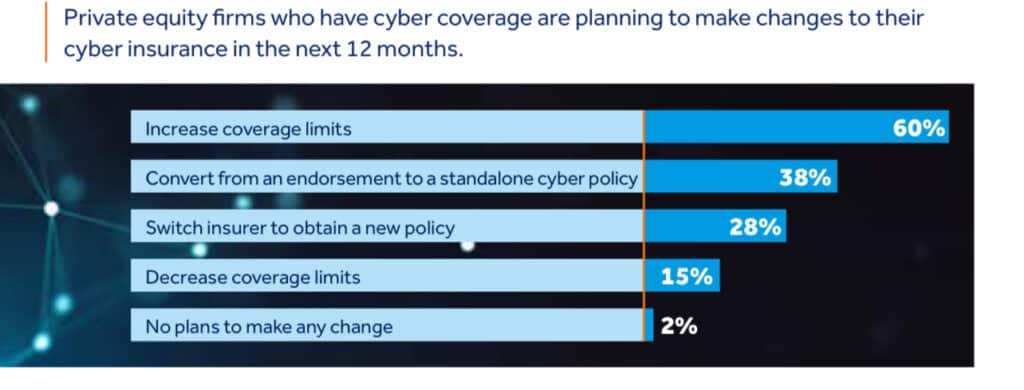Estimated reading time: 5 minutes

Private Equity Faces Escalating Cybersecurity Risks
Private equity firms are navigating an increasing number of cyber risks. These firms manage large volumes of sensitive data. They interact with interconnected networks of portfolio companies and third-party providers. This interconnectedness creates vulnerabilities. If one link in the chain is breached, the entire chain can be at risk. That makes private equity cybersecurity worth a few moments of your time.
A recent survey of 300 private equity leaders by QBE North America highlighted cybersecurity concerns. These professionals oversee assets ranging from $1 billion to $50 billion. The findings reveal a rising tide of cyber incidents and a sluggish adoption of cyber insurance. These trends expose both firms and portfolio companies to dangerous gaps in protection.
Cyber Due Diligence Emerges as a Critical Priority
Before making investments, firms now emphasize cyber risk assessments. Nearly half conduct compliance reviews. Others investigate third-party risks and internal cybersecurity controls. The shift is clear—cyber due diligence is becoming a standard investment filter.
Yet, some firms still prioritize financials over cyber evaluations. This decision, while traditional, is now increasingly risky. Cyberattacks can disrupt business operations and damage investment value. Firms that overlook digital vulnerabilities could face painful consequences.
Attack Trends Push Firms Into Action
Cyber threats are no longer theoretical. They’re increasingly common. Over half of firms surveyed reported that up to 25% of their portfolio companies experienced cyber incidents in the past year. Another 23% said this figure ranged from 26% to 50%.
Common threats include ransomware, cloud security gaps, and business email compromise. For 46% of respondents, ransomware or extortion impacted as many as half of their affected companies. These incidents have the potential to cripple portfolio performance and derail strategic plans.
Cyber Resilience Initiatives Gain Momentum
To address these threats, private equity firms are strengthening cyber defenses across their ecosystems. The majority now require baseline technical protections. These include endpoint protection and multi-factor authentication.
Most firms also demand clear governance from portfolio companies. Incident response plans, data classification protocols, and asset inventories are standard expectations. Additionally, nearly all firms require visibility into incidents. This transparency enables quick containment and risk analysis.
Thanks to these actions, 43% of firms reported that most of their portfolio companies have enhanced their cybersecurity measures following the acquisition. These improvements include stronger policies and enhanced tools.
Cyber Insurance Adoption Lags Despite Rising Risk
Cyber insurance offers a valuable buffer against digital threats. Yet, adoption remains low in private equity circles. Sixty percent of firms report that fewer than half of their target investments have cyber insurance.

Among private equity firms themselves, just 53% maintain a cyber policy. This is troubling, given the increasing sophistication of attacks. Despite this, there is momentum: 60% of insured firms plan to raise their coverage limits in the next year.
The survey indicates that many private equity professionals undervalue cyber insurance. They may not understand the full scope of benefits. Beyond financial protection, insurers offer risk assessments and vulnerability scanning. These services could help portfolio companies strengthen their security frameworks.
Why This Gap in Cyber Insurance Is Risky
The lack of insurance can result in significant losses. Without coverage, legal fees, data recovery costs, and ransom demands can significantly impact the balance sheet. Business disruption alone can result in millions of dollars in revenue loss.
Moreover, uninsured portfolio companies can hurt firm-wide valuation. If attackers exploit one company, it could compromise others. This makes insurance not just advisable but essential for interconnected business models.
Cyber Insurance Benefits Often Overlooked
It isn’t just in this industry that cyber insurance is overelooked and executives don’t know insurers offer more than policies. Value-added services, such as forensic support and breach coaching, are standard in top-tier plans. These resources help companies prepare for attacks and minimize damage.
Still, firms must choose policies wisely. Coverage varies. Some policies exclude specific threat types or impose steep deductibles. A careful review of terms is critical.
Get The Cyber Insurance News Upload Delivered
Every Sunday
Subscribe to our newsletter!
Education Is Key to Improving Adoption
The low adoption rate stems partly from a lack of understanding. Many firms remain unaware of how comprehensive cyber insurance has become. Others believe existing IT controls are sufficient. However, insurance complements controls—it doesn’t replace them.
Education campaigns could help close this gap. Firms must understand that coverage is an integral part of a comprehensive security strategy.
A Long-Term View on Cyber Risk
Cyber threats are not going away. From deal sourcing to exit, private equity firms must stay vigilant. Cybersecurity should be integrated into every phase of the investment lifecycle.
Best practices include offering cybersecurity training, performing regular risk assessments, and funding security upgrades. Firms should also mandate consistent policy updates and require detailed incident reporting.
By taking a proactive approach, private equity firms can safeguard their portfolios, protect their reputations, and ensure the long-term creation of value.
RELATED COVERAGE
